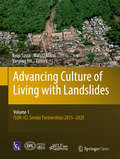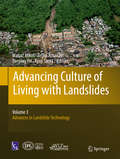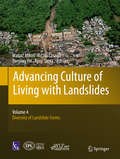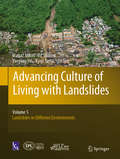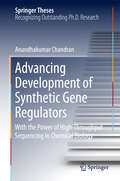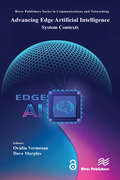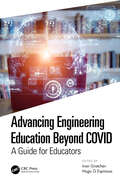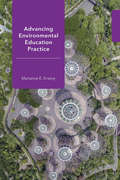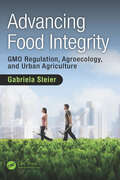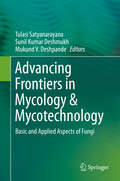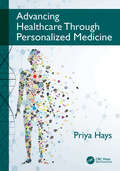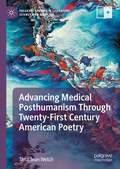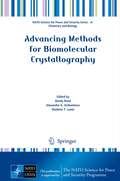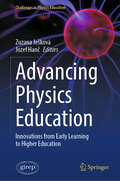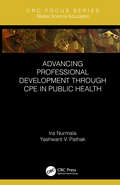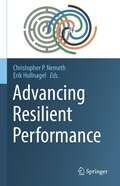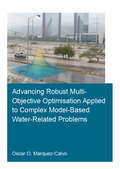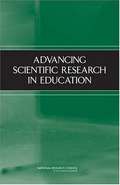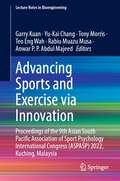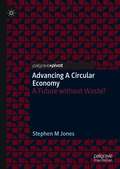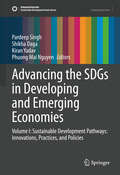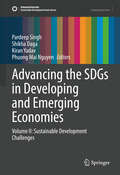- Table View
- List View
Advancing Culture of Living with Landslides: Volume 1 ISDR-ICL Sendai Partnerships 2015-2025
by Kyoji Sassa Yueping Yin Matjaž MikošThis volume includes papers from 4 different sessions pertinent to the main theme - ADVANCES IN LANDSLIDE SCIENCE. The related session descriptions include - a) LANDSLIDE FIELD RECOGNITION IDENTIFICATION: REMOTE SENSING TECHNIQUES, FIELD TECHNIQUES, b) LANDSLIDE INVESTIGATION: FIELD INVESTIGATIONS, LABORATORY TESTING, c) LANDSLIDE MODELING: LANDSLIDE MECHANICS AND SIMULATION MODELS, and d) LANDSLIDE HAZARD, RISK ASSESSMENT & PREDICTION: LANDSLIDE INVENTORIES & SUSCEPTIBILITY, HAZARD MAPPING METHODS, DAMAGE POTENTIAL
Advancing Culture of Living with Landslides: Volume 3 Advances in Landslide Technology
by Kyoji Sassa Yueping Yin Matjaž Mikoš Željko ArbanasThis volume includes papers from 4 different sessions pertinent to the main theme - ADVANCES IN LANDSLIDE SCIENCE. The related session descriptions include - a) LANDSLIDE FIELD RECOGNITION IDENTIFICATION: REMOTE SENSING TECHNIQUES, FIELD TECHNIQUES, b) LANDSLIDE INVESTIGATION: FIELD INVESTIGATIONS, LABORATORY TESTING, c) LANDSLIDE MODELING: LANDSLIDE MECHANICS AND SIMULATION MODELS, and d) LANDSLIDE HAZARD, RISK ASSESSMENT & PREDICTION: LANDSLIDE INVENTORIES & SUSCEPTIBILITY, HAZARD MAPPING METHODS, DAMAGE POTENTIAL
Advancing Culture of Living with Landslides: Volume 4 Diversity of Landslide Forms
by Kyoji Sassa Yueping Yin Matjaž Mikoš Nicola CasagliThis book is open access under a CC BY 4. 0 license. This volume contains peer-reviewed papers from the Fourth World Landslide Forum organized by the International Consortium on Landslides (ICL), the Global Promotion Committee of the International Programme on Landslides (IPL), University of Ljubljana (UL) and Geological Survey of Slovenia in Ljubljana, Slovenia from May 29 to June 2, 2017. The complete collection of papers from the Forum is published in five full-color volumes. Thisfirst volume contains the following: * Three forum lectures * Background and Content of the Sendai Partnerships 2015-2025 * Contribution from the signatory organizations of the Sendai Partnerships * Landslide Dynamics: ISDR-ICL Landslide Interactive Teaching Tools (LIT T) * Progress of the World Report on Landslides (WRL) * International Programme on Landslides (IPL): Objects, History and List of WCoE/IPL projects * UNESCO-KU-ICL UNITIWIN Network supporting IPL * Landslides: Journal of International Consortium on Landslides * International Programme on Landslides (IPL): WCoEs and IPL Projects * Landslides and Society Prof. Kyoji Sassa is the Founding President of the International Consortium on Landslides (ICL). He is Executive Director of ICL and the Editor-in-Chief of International Journal Landslides since its foundation in 2004. Prof. Matjaž Mikos is the Forum Chair of the Fourth World Landslide Forum. He is the Vice President of International Consortium on Landslides and President of the Slovenian National Platform for Disaster Risk Reduction. Prof. Yueping Yin is the President of the International Consortium on Landslides and the Chairman of the Committee of Geo-Hazards Prevention of China, and the Chief Geologist of Geo-Hazard Emergency Technology, Ministry of Land and Resources, P. R. China. IPL (International Programme on Landslides) is a programme of the ICL. The programme is managed by the IPL Global Promotion Committee including ICL and ICL supporting organizations, UNESCO, WMO, FAO, UNISDR, UNU, ICSU, WFEO, IUGS and IUGG. The IPL contributes to the United Nations International Strategy for Disaster Reduction and the ISDR-ICL Sendai Partnerships 2015-2025.
Advancing Culture of Living with Landslides: Volume 5 Landslides in Different Environments
by Kyoji Sassa Yueping Yin Matjaž Mikoš Vít VilímekThis book is open access under a CC BY 4. 0 license. This volume contains peer-reviewed papers from the Fourth World Landslide Forum organized by the International Consortium on Landslides (ICL), the Global Promotion Committee of the International Programme on Landslides (IPL), University of Ljubljana (UL) and Geological Survey of Slovenia in Ljubljana, Slovenia from May 29 to June 2, 2017. The complete collection of papers from the Forum is published in five full-color volumes. Thisfirst volume contains the following: * Three forum lectures * Background and Content of the Sendai Partnerships 2015-2025 * Contribution from the signatory organizations of the Sendai Partnerships * Landslide Dynamics: ISDR-ICL Landslide Interactive Teaching Tools (LIT T) * Progress of the World Report on Landslides (WRL) * International Programme on Landslides (IPL): Objects, History and List of WCoE/IPL projects * UNESCO-KU-ICL UNITIWIN Network supporting IPL * Landslides: Journal of International Consortium on Landslides * International Programme on Landslides (IPL): WCoEs and IPL Projects * Landslides and Society Prof. Kyoji Sassa is the Founding President of the International Consortium on Landslides (ICL). He is Executive Director of ICL and the Editor-in-Chief of International Journal Landslides since its foundation in 2004. Prof. Matjaž Mikos is the Forum Chair of the Fourth World Landslide Forum. He is the Vice President of International Consortium on Landslides and President of the Slovenian National Platform for Disaster Risk Reduction. Prof. Yueping Yin is the President of the International Consortium on Landslides and the Chairman of the Committee of Geo-Hazards Prevention of China, and the Chief Geologist of Geo-Hazard Emergency Technology, Ministry of Land and Resources, P. R. China. IPL (International Programme on Landslides) is a programme of the ICL. The programme is managed by the IPL Global Promotion Committee including ICL and ICL supporting organizations, UNESCO, WMO, FAO, UNISDR, UNU, ICSU, WFEO, IUGS and IUGG. The IPL contributes to the United Nations International Strategy for Disaster Reduction and the ISDR-ICL Sendai Partnerships 2015-2025.
Advancing Development of Synthetic Gene Regulators: With the Power of High-Throughput Sequencing in Chemical Biology (Springer Theses)
by Anandhakumar ChandranThis book focuses on an "outside the box" notion by utilizing the powerful applications of next-generation sequencing (NGS) technologies in the interface of chemistry and biology. In personalized medicine, developing small molecules targeting a specific genomic sequence is an attractive goal. N-methylpyrrole (P)-N-methylimidazole (I) polyamides (PIPs) are a class of small molecule that can bind to the DNA minor groove. First, a cost-effective NGS (ion torrent platform)-based Bind-n-Seq was developed to identify the binding specificity of PIP conjugates in a randomized DNA library. Their biological influences rely primarily on selective DNA binding affinity, so it is important to analyze their genome-wide binding preferences. However, it is demanding to enrich specifically the small-molecule-bound DNA without chemical cross-linking or covalent binding in chromatinized genomes. Herein is described a method that was developed using high-throughput sequencing to map the differential binding sites and relative enriched regions of non-cross-linked SAHA-PIPs throughout the complex human genome. SAHA-PIPs binding motifs were identified and the genome-level mapping of SAHA-PIPs-enriched regions provided evidence for the differential activation of the gene network. A method using high-throughput sequencing to map the binding sites and relative enriched regions of alkylating PIP throughout the human genome was also developed. The genome-level mapping of alkylating the PIP-enriched region and the binding sites on the human genome identifies significant genomic targets of breast cancer. It is anticipated that this pioneering low-cost, high through-put investigation at the sequence-specific level will be helpful in understanding the binding specificity of various DNA-binding small molecules, which in turn will be beneficial for the development of small-molecule-based drugs targeting a genome-level sequence.
Advancing Edge Artificial Intelligence: System Contexts (River Publishers Series in Communications and Networking)
by Ovidiu Vermesan Dave MarplesThe intersection of AI, the Internet of Things (IoT) and edge computing has kindled the edge AI revolution that promises to redefine how we perceive and interact with the physical world through intelligent devices. Edge AI moves intelligence from the network centre to the devices at its edge, entrusting these endpoints to analyse data locally, make decisions, and provide real-time responses.Recent advances in power-efficient high-performance embedded silicon make edge AI a viable proposition, albeit one requiring new distributed architectures and novel design concepts. Moving decision-making closer to the edge makes responses faster and systems more reliable, while the constant pressure to reduce network bandwidth demand and the need to contain spiralling data storage and operations costs help justify the engineering investment necessary to embrace this new paradigm. Moving to decentralised operation opens the door to a multitude of novel applications, covering immersive technologies and autonomous systems across fields as diverse as healthcare and industrial automation, personal assistance and prognostics, surgery, and process control. In the best tradition of systems engineering, the first stage of this transition process is understanding the application domain for edge AI deployment, the ""system context"".This book presents some key topics and early thinking from the EdgeAI* project, covering data backhaul technologies, lifecycle management, mechanisms for developing AIs at the edge and techniques for interacting with those AIs. It provides examples of application domains before concluding with a review of how edge AI systems can be understood by their users. It also examines and presents new results based on current investigations and activities in edge AI technologies, considering the future trends in autonomic systems, hyperautomation, AI engineering, generative AI, connectivity, and cybersecurity mesh.This book aims to empower the reader with the knowledge and insights needed to understand and embrace the transformative power of edge AI technology. The extensively referenced chapters, contributed by experts and thought leaders in the field, are recommended to anyone interested in developing edge AI systems.*Edge AI Technologies for Optimised Performance Embedded Processing" (EdgeAI) Key Digital Technologies (KDT) Joint Undertaking (JU) European research project. https://https://edge-ai-tech.eu/
Advancing Engineering Education Beyond COVID: A Guide for Educators
by Ivan Gratchev Hugo G. EspinosaEducators, are you ready to meet the challenge of cultivating the next generation of engineers in a post-COVID-19 context? Current engineering student cohorts are unique to their predecessors: they are more diverse and have experienced unprecedented disruption to their education due to the COVID-19 pandemic. They will also play a more significant role in contributing to global sustainability efforts. Innovating engineering education is of vital importance for preparing students to confront society’s most significant sustainability issues: our future depends on it. Advancing Engineering Education Beyond COVID: A Guide for Educators offers invaluable insights on topics such as implementing active-learning activities in hybrid modes; developing effective and engaging online resources; creating psychologically safe learning environments that support academic achievement and mental health; and embedding sustainability within engineering education. Students’ own perspectives of online learning are also incorporated, with the inclusion of a chapter authored by undergraduate engineering students. This book consolidates the expertise of leading authorities within engineering education, providing an essential resource for educators responsible for shaping the next generation of engineers in a post-COVID-19 world.
Advancing Environmental Education Practice (Cornell Series in Environmental Education)
by Marianne E. KrasnyIn this important intervention, change-agent Marianne E. Krasny challenges the knowledge-attitudes-behavior pathway that underpins much of environmental education practice; i.e., the assumption that environmental knowledge and attitudes lead to environmental behaviors. Krasny shows that certain types of knowledge are more likely than others to influence behaviors, and that generally it is more effective to work with existing attitudes than to try to change them. The chapters expand the purview of potential outcomes of environmental education beyond knowledge and attitudes to include nature connectedness, sense of place, efficacy, identity, norms, social capital, youth assets, and individual wellbeing.Advancing Environmental Education Practice also shows how, by constructing theories of change for their environmental education programs, environmental educators can target specific intermediate outcomes likely to lead to environmental behaviors and collective action, and plan activities to achieve those intermediate outcomes. In some cases, directly engaging program participants in the desired behavior or collective action can lead to changes in efficacy, sense of place, and other intermediate outcomes, which in turn foster future environmental actions. Finally, Advancing Environmental Education Practice shares twenty-four surveys that assess changes in environmental behaviors and intermediate outcomes, and provides guidelines for qualitative evaluations.Thanks to generous funding from the Cornell Department of Natural Resources, the ebook editions of this book are available as Open Access volumes from Cornell Open (cornellopen.org) and other Open Access repositories.
Advancing Food Integrity: GMO Regulation, Agroecology, and Urban Agriculture
by Gabriela SteierKey features: Presents summaries of key points after each chapter and includes color graphs to visualize the big-picture concepts Demonstrates how urban rooftop farms (URFs) can contribute to city greening and climate change mitigation worldwide while providing fresh locally-sourced produce for growing urban populations Provides cutting-edge ideas from the the emerging field of food law and places international and comparative legal concepts into an accessible context for non-lawyers Examines major disputes surrounding food products that have been brought before the World Trade Organization (WTO) to illustrate how trade trends have pushed toward GMO proliferation Uses examples of food labeling, pollinator protection, pesticide permitting, invasive species control, and GMO regulatory policy in the US and the EU to illustrate various methods of bringing public law to the forefront in the struggle toward achieving food integrity The proliferation of Genetically Modified Organisms (GMOs) in our increasingly globalized food system is trivializing the inherent risks to a sustainable world. Responding to the realities of climate change, urbanization, and a GMO-dominated industrialized food system, Gabriela Steier's seminal work addresses the interrelationship of these cutting-edge topics within a scholarly, legal context. In Advancing Food Integrity: GMO Regulation, Agroecology, and Urban Agriculture, Steier defines food integrity as the optimal measure of environmental sustainability and climate change resilience combined with food safety, security, and sovereignty for the farm-to-fork production and distribution of any food product. The book starts with a discussion of the food system and explores whether private law has sufficiently protected food or whether public law control is needed to safeguard food integrity. It proceeds to show how the proliferation of GMOs creates food insecurity by denying people’s access to food through food system centralization. Steier discusses how current industrial agricultural policy downplays the dangers of GMO monocultures to crop diversity and biodiversity, thereby weakening food production systems. Striving to promote agroecology by providing a fresh and compelling narrative of interdisciplinary questions, Steier explores how farming can be geared toward more sustainable and environmentally friendly practices worldwide in the future. This book belongs in the libraries of all those interested in food law, environmental law, agroecology, sustainable agriculture, and urban living practices.
Advancing Frontiers in Mycology & Mycotechnology: Basic and Applied Aspects of Fungi
by Tulasi Satyanarayana Sunil Kumar Deshmukh Mukund V. DeshpandeThe book provides an introduction to the basics of fungi, discussing various types ranging from edible mushrooms to Neurospora – a model system for genetics and epigenetics. After addressing the classification and biodiversity of fungi, and fungi in different ecological niches, it describes the latest applications of fungi, their role in sustainable environments and in alleviating stress in plants, as well as their role in causing plant and animal diseases. Further chapters explore the advances in fungal interactions research and their implications for various systems, and discuss plant-pathogen interactions. The book also features a section on bioprospecting, and is an extremely interesting and informative read for anybody involved in the field of mycology, microbiology and biotechnology teaching and research.
Advancing Healthcare Through Personalized Medicine
by Priya HaysThis innovative book provides a unique perspective on the biomedical and societal implications of personalized medicine and how it will help mitigate the healthcare crisis and rein in ever-growing expenditure. It introduces the reader to underlying concepts at the heart of personalized medicine - pharmacogenomics, targeted therapies and individualized diagnosis and treatment - and shows how, with the advent of genomic technologies, clinicians will have the capability to predict and diagnose disease more efficiently. Advocating a patient-centred approach at the heart of care, this introduction to personalized medicine, the science behind it, its economic effects, its effects upon patients and its overall implications for society will be invaluable to clinicians, to healthcare providers and to patients.
Advancing Land Change Modeling: Opportunities and Research Requirements
by Committee on Needs Research Requirements for Land Change ModelingPeople are constantly changing the land surface through construction, agriculture, energy production, and other activities. Changes both in how land is used by people (land use) and in the vegetation, rock, buildings, and other physical material that cover the Earth's surface (land cover) can be described and future land change can be projected using land-change models (LCMs). LCMs are a key means for understanding how humans are reshaping the Earth's surface in the past and present, for forecasting future landscape conditions, and for developing policies to manage our use of resources and the environment at scales ranging from an individual parcel of land in a city to vast expanses of forests around the world. "Advancing Land Change Modeling: Opportunities and Research Requirements" describes various LCM approaches, suggests guidance for their appropriate application, and makes recommendations to improve the integration of observation strategies into the models. This report provides a summary and evaluation of several modeling approaches, and their theoretical and empirical underpinnings, relative to complex land-change dynamics and processes, and identifies several opportunities for further advancing the science, data, and cyberinfrastructure involved in the LCM enterprise. Because of the numerous models available, the report focuses on describing the categories of approaches used along with selected examples, rather than providing a review of specific models. Additionally, because all modeling approaches have relative strengths and weaknesses, the report compares these relative to different purposes. "Advancing Land Change Modeling's" recommendations for assessment of future data and research needs will enable model outputs to better assist the science, policy, and decisionsupport communities.
Advancing Medical Posthumanism Through Twenty-First Century American Poetry (Palgrave Studies in Literature, Science and Medicine)
by Tana Jean WelchAdvancing Medical Posthumanism Through Twenty-First Century American Poetry places contemporary poetics in dialogue with posthumanism and biomedicine in order to create a framework for advancing a posthuman-affirmative ethics within the culture of medical practice. This book makes a case for a posthumanist understanding of the body—one that sees health and illness not as properties possessed by individual bodies, but as processes that connect bodies to their social and natural environment, shaping their capacity to act, think, and feel. Tana Jean Welch demonstrates how contemporary American poetry is specifically poised to develop a pathway toward a posthuman intervention in biomedicine, the field of medical humanities, medical discourse, and the value systems that guide U.S. healthcare in general.
Advancing Methods for Biomolecular Crystallography (NATO Science for Peace and Security Series A: Chemistry and Biology)
by Alexandre G. Urzhumtsev Randy Read Vladimir Y. LuninThis work presents a snapshot of the state of the art of modern biomolecular crystallography, from crystallisation through structure determination and even interactive presentation on the web. Methods driving the latest automated structure determination pipelines are explained, as well as how to deal with problems such as crystal pathologies that still demand expert analysis. These methods are illustrated through their application to problems of great biological interest, such as the molecular machinery underlying the complement pathway, the mechanism of action of monoamine oxidase inhibitors, and the structure of the eukaryotic ribosome. Complementary approaches, such as neutron diffraction, small angle X-ray scattering, coherent diffraction and computational modelling, are also explored.
Advancing Physics Education: Innovations from Early Learning to Higher Education (Challenges in Physics Education)
by Zuzana Ješková Jozef HančThis book offers a rich selection of papers from a conference dedicated to the advancement of physics education at all levels. Addressing the pressing need for innovation in teaching and learning, the contributions span pre-school to higher education, showcasing a broad spectrum of innovative proposals aimed at enriching the physics learning experience. The contributions reflect key thematic tracks, including innovative strategies and pathways to improve physics education, lab work and experiments in physics education, digital technologies in physics education, and school-university collaborations. These tracks provide a cohesive structure, while the individual contributions present research-informed insights and exemplary teaching practices that resonate across age groups and educational contexts. For pre-school and primary learners, the papers highlight creative learning pathways, hands-on activities, and play-based strategies that introduce young minds to fundamental physical concepts in an engaging and accessible way. At the secondary level, the focus shifts to inquiry-based teaching practices, lab work, and the integration of digital tools that develop students&’ critical thinking skills and deepen their understanding of core physics principles. For higher education, the papers present advanced experimental techniques and interdisciplinary approaches, demonstrating effective strategies for teaching complex concepts to university students as well as novel methods for fostering connections between schools and universities, emphasizing how collaboration enhances teaching practices and supports student learning. Additionally, the contributions examine how physics education research informs these practices, ensuring that the methods presented are not only innovative but also evidence-based. Grounded in physics education research, the book bridges the gap between theory and practice. Many of the contributions draw on real-world classroom experiences, offering practical applications alongside research findings. This makes the book an invaluable resource for educators, researchers, and policymakers seeking to advance physics education across all levels.
Advancing Prion Science: Guidance for the National Prion Research Program
by Institute of Medicine of the National AcademiesIn Advancing Prion Science, the Institute of Medicine's Committee on Transmissible Spongiform Encephalopathies Assessment of Relevant Science recommends priorities for research and investment to the Department of Defense's National Prion Research Program (NPRP). <P><P>Transmissible spongiform encephalopathies (TSEs), also called prion diseases, are invariably fatal neurodegenerative infectious diseases that include bovine spongiform encephalopathy (commonly called mad cow disease), chronic wasting disease, scrapie, and Creutzfeldt-Jakob disease. To develop antemortem diagnostics or therapies for TSEs, the committee concludes that NPRP should invest in basic research specifically to elucidate the structural features of prions, the molecular mechanisms of prion replication, the mechanisms of TSE pathogenesis, and the physiological function of prions' normal cellular isoform. Advancing Prion Science provides the first comprehensive reference on present knowledge about all aspects of TSEs-from basic science to the U.S. research infrastructure, from diagnostics to surveillance, and from prevention to treatment.
Advancing Professional Development through CPE in Public Health (Global Science Education)
by Yashwant V. Pathak Ira NurmalaThe education division is a prominent part of the public health profession. It focuses on educating individuals and communities to promote health and prevent disease. The educators are drawn from a diverse range of disciplines and defined as professionally prepared individuals who serve in a variety of roles using appropriate educational strategies and methods to facilitate the development of policies, procedures, interventions, and systems conducive to the health of individuals.This unique volume in the Global Science Education Series describes some of the challenges faced by this profession in helping the audience to understand public health and solve health issues. Key Features: Aids researchers in designing an evaluation study in CPE for health professions and related fields Presents data on how public health practice comprises of individuals working together toward promoting population health Covers continuing professional education in the US and how it can be adopted globally Discusses the Kirkpatrick’s four-level evaluation model at length Demonstrates how questionnaires are preferable in evaluating CPE programs due to their cost effectiveness and being user friendly
Advancing Resilient Performance
by Erik Hollnagel Christopher P. NemethResilience Engineering (RE) studies have successfully identified and described many instances of resilient performance in high hazard sectors as well as in the far more frequent cases where people and organisations cope with the uncertainties of daily operations. Since RE was first described in 2006, a steady accumulation of insights and efforts have provided the basis for practical tools and methods. This development has been documented by a series of texts in the Resilience Engineering Perspectives series as well as by a growing number of papers and reports. This book encapsulates the essential practical lessons learned from the use of Resilience Engineering (RE) for over ten years. The main contents are a series of chapters written by those who have been instrumental in these applications. To increase the value for the reader, each chapter will include: rationale for the overall approach; data sought and reason(s) for choosing; data sources used, data analyses performed, and how recommendations were made and turned into practice.Serving as a reference for practitioners who want to analyse, support, and manage resilient performance, this book also advances research into RE by inquiring why work goes well in unpredictable environments, to improve work performance, or compensate for deficiencies.
Advancing Robust Multi-Objective Optimisation Applied to Complex Model-Based Water-Related Problems (IHE Delft PhD Thesis Series)
by Oscar Osvaldo Marquez CalvoThe exercise of solving engineering problems that require optimisation procedures can be seriously affected by uncertain variables, resulting in potential underperforming solutions. Although this is a well-known problem, important knowledge gaps are still to be addressed. For example, concepts of robustness largely differ from study to study, robust solutions are generally provided with limited information about their uncertainty, and robust optimisation is difficult to apply as it is a computationally demanding task. The proposed research aims to address the mentioned challenges and focuses on robust optimisation of multiple objectives and multiple sources of probabilistically described uncertainty. This is done by the development of the Robust Optimisation and Probabilistic Analysis of Robustness algorithm (ROPAR), which integrates widely accepted robustness metrics into a single flexible framework. In this thesis, ROPAR is not only tested in benchmark functions, but also in engineering problems related to the water sector, in particular the design of urban drainage and water distribution systems. ROPAR allows for employing practically any existing multi-objective optimisation algorithm as its internal optimisation engine, which enables its applicability to other problems as well. Additionally, ROPAR can be straightforwardly parallelized, allowing for fast availability of results.
Advancing Scientific Research In Education
by National Research Council of the National AcademiesTransforming education into an evidence-based field depends in no small part on a strong base of scientific knowledge to inform educational policy and practice. Advancing Scientific Research in Education makes select recommendations for strengthening scientific education research and targets federal agencies, professional associations, and universities—particularly schools of education—to take the lead in advancing the field.
Advancing Sports and Exercise via Innovation: Proceedings of the 9th Asian South Pacific Association of Sport Psychology International Congress (ASPASP) 2022, Kuching, Malaysia (Lecture Notes in Bioengineering)
by Tony Morris Rabiu Muazu Musa Anwar P. P. Abdul Majeed Garry Kuan Yu-Kai Chang Teo Eng WahThis book presents the proceedings of the 9th Asian South Pacific Association of Sport Psychology International Congress (ASPASP) 2022, Kuching, Malaysia, which entails the different sporting innovation themes, namely, Applied Sport and Social Psychology, Health and Exercise, Motor Control and Learning, Counselling and Clinical Psychology, Biomechanics, Data Mining and Machine Learning in Sports amongst others. It presents the state-of-the-art technological advancements towards the aforesaid themes and provides a platform to shape the future direction of sport science, specifically in the field sports and exercise psychology.
Advancing Variable Star Astronomy
by Thomas R. Williams Michael SaladygaFounded in 1911, the AAVSO boasts over 1200 members and observers and is the world's largest non-profit organization dedicated to variable star observation. This timely book marks the AAVSO's centennial year, presenting an authoritative and accurate history of this important association. Writing in an engaging and accessible style, the authors move chronologically through five eras of the AAVSO, discussing the evolution of its structure and purpose. Throughout the text, the main focus is on the thousands of individuals whose contributions have made the AAVSO's progress possible. Describing a century of interaction between amateur and professional astronomers, the authors celebrate the collaborative relationships that have existed over the years. As the definitive history of the first hundred years of the AAVSO, this text has broad appeal and will be of interest to amateur and professional astronomers, as well as historians and sociologists of science in general.
Advancing a Circular Economy: A Future without Waste?
by Stephen M JonesThis book explores an escalating modern-day crisis; managing waste in a sustainable way. The central question posed is whether advancing a circular economy provides a way to shift waste management practices towards more sustainable approaches. It begins with an in-depth analysis of the nature of waste management and the prevailing crisis, followed by a discussion about the circular economy in terms of its requirements and the challenges of implementation. The book then moves on to propose a framework that sets out how to establish the policy changes needed to advance a circular approach to waste management. Next, the book outlines complex issues in multilevel systems for advancing a circular economy through examining the contemporary situation in Belgium and Norway. It ends by bringing together the issues revealed in these case studies and draws insights for governments advocating circular approaches. The book will be a valuable resource to scholars, students, practitioners and policy makers interested in developing more sustainable methods of waste management.
Advancing the SDGs in Developing and Emerging Economies: Volume I: Sustainable Development Pathways: Innovations, Practices, and Policies (Sustainable Development Goals Series)
by Pardeep Singh Shikha Daga Kiran Yadav Phuong Mai NguyenThis contributed volume, the first in a set of two, explores the intersection of innovation and sustainability, investigating how transformative practices across various industries and regions are advancing the Sustainable Development Goals (SDGs). It highlights a wide network of solutions and real-world examples that integrate various SDG principles into business and government strategies. The chapters cover diverse topics, including green finance, human resource management, sustainable marketing, and the adoption of cutting-edge technologies, showcasing how innovation is driving the global transition towards a more sustainable future. The geographic diversity represented in this section—including contributions from Italy, Brazil, Vietnam, India, and Malaysia—provides a rich, multi-regional perspective on sustainable development. The chapters reflect the dynamic ways in which innovation is being harnessed to address pressing global challenges, with a focus on both local and global contexts. Each chapter offers in-depth case studies and practical examples, illustrating how SDG principles are being integrated into various sectors to foster long-term sustainability. Together, these contributions emphasize the critical role of innovative strategies and practices in achieving the SDGs and building a more resilient, sustainable world for future generations.
Advancing the SDGs in Developing and Emerging Economies: Volume II: Sustainable Development Challenges (Sustainable Development Goals Series)
by Pardeep Singh Shikha Daga Kiran Yadav Phuong Mai NguyenThis volume, the second in a set of two, focuses on the challenges faced by countries and regions in implementing sustainable development. This volume addresses the obstacles encountered by emerging economies, particularly in areas such as policy implementation, resource mobilization, and institutional barriers. The content takes a critical and analytical approach, offering strategic insights and case studies on how these challenges are being addressed. The chapters cover themes like energy sustainability, gender parity, and foreign direct investment (FDI) and explore strategies like public-private partnerships and socio-ecological resilience. Volume II also looks at how different nations, particularly India, Serbia, and Malaysia, are tackling these challenges and seeks to provide actionable insights on overcoming the difficulties that hinder sustainable development. While Volume I adopts a more optimistic, solution-oriented tone, showcasing how innovation is already driving sustainable development, Volume II has a problem-solving and critical tone, focusing on the barriers that need to be overcome for sustainability to be fully realized. Volume I is centered on positive examples and the transformative potential of innovative practices, whereas Volume II focuses on the complexities of achieving sustainability and provides strategic solutions for overcoming challenges. Together, the two volumes offer a comprehensive look at the opportunities and challenges in the pursuit of sustainable development.
